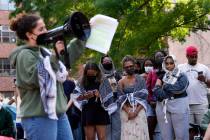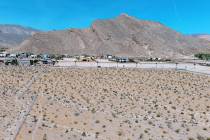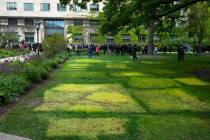For poet, Great Basin an acquired taste
The Great Basin was an acquired taste for Gary Snyder.
Raised on a family dairy farm in the lush Pacific Northwest, Snyder's early sensibility was informed by spruce forests and wilderness and the snow-capped majesty of the great Cascades. When it comes to natural beauty, the Puget Sound wins most pageants and is as easy to love as pie.
Nevada's big empty, on the other hand, must have felt more like visiting a strange planet for Snyder, who crisscrossed the great arid outback as a young man and before settling in the foothills of the eastern Sierra. The 85-year-old poet and environmentalist, whose work influenced the biggest names in the Beat Generation and continues to reverberate today, gradually felt the mystery of the sage-scented landscape that is lost on so many strangers to our strange land.
As he espoused his love of his place in the world recently as part of a public lands panel sponsored by UNLV's Black Mountain Institute, Snyder reminded an audience filled with academics and strongly held opinions that the value of our open spaces cannot be measured only in mineral resources and board feet of timber. And it ought not be managed like a super-sized city park, either.
There is soul value in all that space.
It was Snyder who once wrote, "O, ah! The awareness of emptiness brings forth a heart of compassion!"
He is a Buddhist monk, the author of 20 books, a translator of Chinese and Japanese poetry, a former fire lookout and logger, a painter. A winner of the Pulitzer Prize, Snyder is not a Buddhist without a cause.
In an April interview with National Public Radio, Snyder said: "Poetry isn't about just nature. It's about reality. And as a Buddhist, Buddhism does not just favor a nice side of the phenomenal universe. Buddhism says we are all students of reality, whatever it is."
For Snyder, the environment is alive in ways seen and unseen. And although we the people certainly own our land, it's imperative we protect it for future use.
There is a wide diversity of ownership interests, but "there should be under all of them a level of ecological, scientific, and spiritual if necessary, thinking that observes and respects living beings, plants and animals, in any case, and would never say that the sagebrush steps of Nevada are worthless ... with or without cattle, they're not worthless. the birds and the lizards, we all love them."
It was Snyder who observed, "Nature is not a place to visit. It is home."
Our home. Even in scarred and care-worn Nevada with its hundreds of mountain ranges and precious little rain.
There is a reason Snyder is sometimes called America's "poet laureate of Deep Ecology." There is a reason Jack Kerouac, when writing "The Dharma Bums," based the character Japhy Ryder on his outdoor-adoring, Buddha-loving running mate, Snyder.
Not a place. Home.
After living in the Pacific Northwest, "later I discovered the Great Basin," Snyder recalled. "I hitchhiked across it several times, and it took me four or five years to learn to love it."
The audience laughed, then breathed in his meaning, "viscerally the smell of sagebrush ... and the great blue spaces and all the wonderful little lizards and birds in the sagebrush and the smell of sagebrush when you put it on the fire. It totally converted me."
Sagebrush. After a thunderstorm or on the campfire, it gets them every time.
John L. Smith's column appears Sunday, Tuesday, Wednesday, Friday and Saturday. He can be reached at 702-383-0295 or jsmith@reviewjournal.com. On Twitter: @jlnevadasmith.























